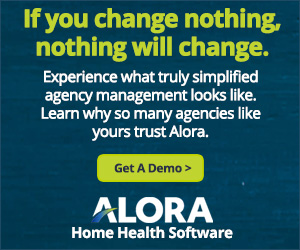
02 Feb Operational & Procedural Strategies for Homecare Agencies
Spotlight on Your Home Health Agency
Optimal Operational and Procedural Strategies to Stand Out
A well-oiled machine runs smooth, has minimal resistance when functioning and ultimately gets the job done exceptionally well in comparison to others that are not so refined. Application of this concept within homecare agencies yields a productive and successful business. Focusing on the inner workings of the agency through well-planned and executed operations and procedures can be key to standing out above the crowd.
Attract and Keep Star Staff
Frontline staff represent you and your brand, impacting your credibility as a business. Attract star staff, help them become invested as employees and your company will shine. Retaining quality staff starts with ensuring candidates understand their role within the company, expectations for their day-to-day work and how it fits into the larger mission of the agency prior to accepting a position. A key to laying a foundation for successful employment also includes a well-structured orientation focusing on the needs of new team members as well as reviewing the specific policies and procedures related to their role. The agency must clearly identify what it is, and what it is not.
Standards of practice (SOPs) that explain various company policies and procedures must be kept current by the agency, be readily available to all staff and be addressed not only upon hire. SOPs must address patient care areas of admissions, discharges, activities of daily living, medication management, documentation expectations, triage and lab or wound care if applicable. Further SOPs must include details on staff workflow, professionalism, scheduling expectations, calling in to work, as well as mileage reimbursement and pay if applicable. A platform to allow remote staff easy access to the most updated SOPs will allow for a more collaborative, cohesive team.
Investing in staff upfront can both reduce costs and improve patient experiences. Adequate training has demonstrated a reduction in turnover and caregiver burnout. Enrolling new staff in mentor programs that partner new staff with seasoned ones can further promote a positive work culture in which caregivers feel more confident and committed to their work. It also provides new staff with an example of the cultural expectations of which to mimic in their role when independent.
Supporting new staff and checking in not only when hired but at regular intervals can promote a time for employees to bring forward what is working well, and what is not. Regular co-visits by leadership or peers during patient visits will also reinforce compliance with policy and procedure. This time also allows others who might not otherwise be in the home to physically see what processes might need to be refined. Leadership having an open-door policy and the company having a physical or online location to drop suggestion cards for process improvement ideas can improve various aspects of the company.
Coordination with Cooperation
Staff within the home care agency must know how to “play nice in the sandbox” and leadership must not tolerate a toxic work environment if there are individuals breaking down communication and creating a negative dynamic. Many operations and individuals are involved in the process of care coordination in home care and agencies cannot afford barriers to great care. Done well and within a positive work environment, patients easily transition into a model that supports their daily activities and navigate the complexities of healthcare while agencies are reimbursed for the provided care in compliance with regulations. Communication is key to the successful operation of care coordination.
Clearly defined and communicated patient needs upon admission will directly translate into the delivery of services that promote a healthy relationship first between the agency and patient through a well-devised care plan. Beyond the immediate care of the patient, a positive (and negative) experience can easily spread to the greater community and spotlight the agency through online reviews or by word of mouth.
Ideas to support care coordination to make your agency stand out include:
- Ensure staff know the role of others involved in business operations to harmonize team-based care beyond patient case managers. When staff can connect patients or family members with the right department or team member, the burden and barrier to access is removed for the customer.
- Essential tidbits about the patient must be easily available for direct care staff members. When staff enter the home of a patient, they must be prepared to know any unique needs of the patient. Staff must have the ability to review minor nuances in care easily and quickly prior to visiting so they can prepare well. Pets, masking preferences, where to park, how to address the patient or family members, if staff should call while on their way or otherwise, short, detailed instructions provide the best individualized care for patients. Electronic “sticky notes” or similar can provide quick instruction for direct care staff.
- Use home health software technology that standardizes and easily supports the flow of patient care and communication between direct care staff, office and leadership staff as well as payors. Optimal technology will address commonly cited areas of concern for homecare agencies which includes visit verification, scheduling client visits, care planning which includes medication reconciliation and orders, review for chart errors prior to claim submission, readiness for regulatory survey.
Home care agencies can easily be overwhelmed at where to focus time and energy given the multitude of complex functions to simply operate day-to-day. Start small and focus on one area to improve first. Doing even just one function exceptionally well could set an agency apart from the competition. Take a deep look at your individual agency pain points and target one area to improve. Small home care businesses can benefit from a SWOT (strengths, weaknesses, opportunities, threats) analysis of their company and review with a local business mentor. Small wins can create the momentum needed to move, or keep, the agency in the spotlight.
Author’s Note: Views, information, and guidance in this resource are intended for information only. We are not rendering legal, financial, accounting, medical, or other professional advice. Alora disclaims any liability to any third party and cannot make any guarantee related to the content.
Additional Home Health Agency blogs:

Alora’s home health software solution is ideal for agencies operating in both skilled and non-skilled care. Managing workflow for administrative and caregiving staff becomes easier with the right technology tools. Alora has been engineered with the goal of simplification of day-to-day tasks in the office and in the field, allowing agencies to focus on patient care and growth.



No Comments